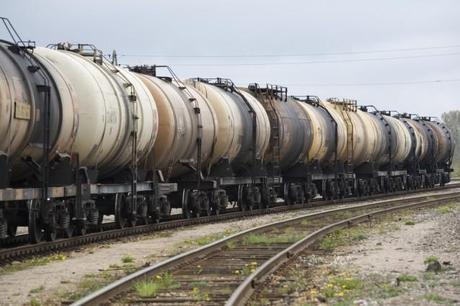by Katie Valentine / Think Progress

BNSF Railway Co. and Union Pacific have asked Washington and Oregon to sign agreements that would stipulate that the volume of oil they ship and the route they use would only be released “for bonafide emergency planning and emergency response activities.” That means emergency responders would only know how much oil is being shipped on what rail routes in certain cases — for instance, if an accident occurs.
Already, Washington has refused to sign the railroads’ agreement because the state says it violates its public records law. Last month, the U.S. Department of Transportation issued an emergency order requiring railroad companies to disclose information on routes, volume of oil and frequency of trains to state officials, but BNSF and Union Pacific want to make sure state officials keep that information to themselves.
Union Pacific says it wants to keep the routes a secret because of national security concerns.
“There’s terrorist issues, identifying what’s a train carrying that people could do something to,” Scott Moore, a Union Pacific spokesman told the Oregonian. “Right or wrong, that’s one of the ways we think we’ve helped deliver things securely is people don’t always know what’s going on. We’re not going to tell him or her when and where.”
However, as the Oregonian points out, though there have been multiple oil-by-rail accidents over the past several years, none of them have been caused by terrorist activity. The editorial board of the Oregonian is opposed to the confidentiality agreement.
“The benefit to the public’s safety in knowing the volume and whereabouts of oil trains outweighs any threat of terrorism,” the board writes. “Gasoline and diesel fuel are routinely and safely shipped by barge up the Columbia River, and the U.S. Coast Guard, as well as anyone accessing the service’s records, can know about each and every journey.”
Right now, Oregon Attorney General Ellen Rosenblum’s office is conducting a review of the confidentiality agreement to determine whether or not it’s in Oregon’s best interest to sign. Rich Hoover, community liaison at the Oregon Office of State Fire Marshal, told ThinkProgress in an email that he doesn’t have a timeline for when the state will decide on the confidentiality agreement and that, since the state is still evaluating the agreement, he didn’t know whether Washington’s decision not to sign would factor in to Oregon’s decision. He also said that right now, the public does not have access to oil-by-rail route information from Oregon’s State Emergency Response Commission.
“We want to provide as much information as we can,” Sue Otjen, Oregon’s State Emergency Response Commission coordinator, told the Oregonian. “We need to know to what extent we can disclose it.”
BNSF and Union Pacific’s push to keep oil-by-rail information under wraps in the Western U.S. comes on the heels of revisions made by the State Department on its impact assessment of the Keystone XL pipeline. The revisions target previous estimates of deaths from oil-by-rail accidents: In January, when the impact statement was released, the State Department estimated that if the pipeline wasn’t built, accidents from oil-by-rail shipments (which State assumes would be responsible for shipping Canadian oil in Keystone XL’s stead) would contribute to 49 injuries and six deaths over a decade. The State Department’s revised figures up those estimates considerably to 189 injuries and 28 deaths over 10 years.
State Department officials issued these corrections because their calculations had previously used a three-month forecast rather than one for a full year, which made the initial estimates too low. But the assumption that tar sands oil will come out of the ground regardless of whether Keystone XL is built or not — and that, in the case the pipeline is rejected, the oil will be shipped by rail — won’t necessarily come to fruition. Shipping oil by rail is dangerous (as the new estimates clearly show) and has already led to major accidents. Most notably and tragically, an oil train that derailed near the tiny Quebec town of Lac Mégantic last summer killed 47 people and destroyed much of the town’s center. It’s also expensive — an analysis by Reuters last year found that shipping oil by rail could cost three times more than shipping it by pipeline, making it a costly alternative.

